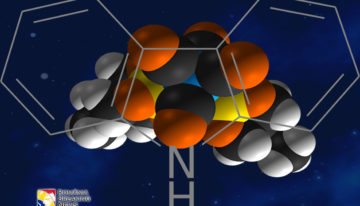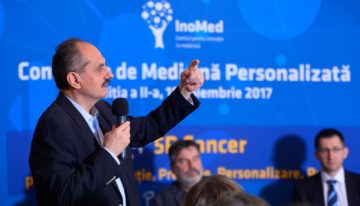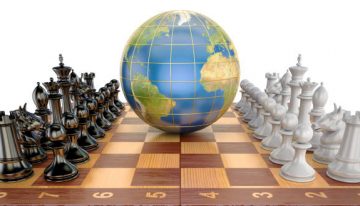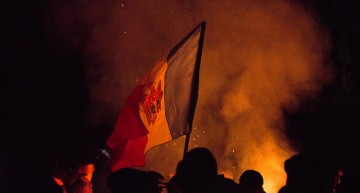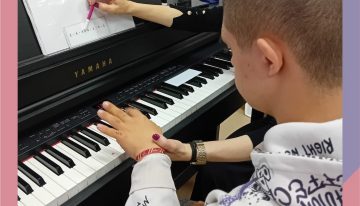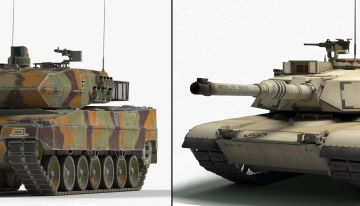România se vede bine din America. Timișoreanul care-i antrenează pe tinerii americani pentru Olimpiadele de Matematică este convins că țara noastră se află pe un drum bun: „Viitorul României e mai bun decât prezentul”. Răzvan Gelca (46 de ani) este una dintre „mințile sclipitoare” formate în sistemul educațional comunist din România și care acum predă matematica la cel mai înalt nivel posibil.
„Voi, dragi prieteni copii și tineri, sunteți aceia care trebuie să faceți totul pentru a vă însuși cele mai noi cunoștințe în toate domeniile de activitate, pentru a putea fi mâine buni constructori ai socialismului, buni muncitori, buni tehnicieni, buni ingineri, buni profesori, buni oameni de știință în toate domeniile” – Nicolae Ceaușescu.
Cândva savantul lui Ceausescu, azi savantul lui Obama
Asta se putea citi în partea de sus a paginii 21 din revista „Flacăra”, numărul din 26 iulie 1985. Era o pagină dedicată celor mai buni elevi din România în acel an. Printre ei – Răzvan Gelca, un adolescent pasionat de matematică și proaspăt câștigător al medaliei de aur de la Olimpiada Internațională de Matematică de la Helsinki. Era printre cei câțiva „savanți de mâine”, pe care Ceaușescu îi vedea vârf de lance la propășirea socialismului românesc.
Generatia de aur a matematicii românesti
Anii au trecut, Răzvan Gelca a terminat liceul, apoi Facultatea de Matematică la Timișoara, a venit Revoluția și din visul lui Ceaușescu n-a mai rămas nimic Savanții noștri de mâine nu aveau niciun „mâine”. Să trăiești din matematică în România anilor ’90 era, practic, imposibil. Cu un CV serios și recunoaștere internațională, Răzvan Gelca se vede, în 1991, în fața unei ecuații cu o singură necunoscută: țara în care să emigreze. Alege America și visul lui de matematician merge mai departe. Își ia doctoratul a Universitatea Iowa, ajunge profesor la Universitatea din Michigan, apoi profesor asociat la Texas Tech University. Convinși de capacitatea de excepție a matematicianului român, americanii îi acordă postul de antrenor al Echipei Olimpice de Matematică a Statelor Unite.
Cu două premii importante în vitrină – „Outstanding Teaching Award” și “D.C. Spriestersbach Dissertation Prize” – cu mii de pagini scrise pe caietele de matematică și preluate de revistele de specialitate, cu două cărți best-seller în matematică și cu amintirea paginii din revista “Flacăra”, Răzvan Gelca trăiește azi o viață de texan adevărat. Uită de cifre străbătând munții din vestul Texasului, grădinărește și umblă cu un aparat de fotografiat la gât, în căutare de peisaje. Am vorbit cu Răzvan Gelca despre trecutul și prezentul lui și despre viitorul României.
“Revăzând articolul din revista «Flacăra» mi-am amintit de colegii mei. Mă gândesc deseori la ei. Atunci, în 1985, în România nu aveai prea multe speranțe. Știu că îmi doream să pot trăi din matematică”, își începe Răzvan Gelca povestea.
Rezistenta prin educatie
În ultimii ani de ceaușism a existat o rezistență prin cultură. Dar până la cultură, a existat o rezistență prin educație. “Invățământul era rezistența prin educație. Sub comuniști, educația era singura avuție. Pentru că era bazat pe competiție și standarde înalte, învățământul nostru era foarte bun. Se poate vedea asta în numărul mare de români care și-au găsit împlinirea lucrând cu creierul, din păcate mai ales pe alte meleaguri”, spune matematicianul român.
Matematica s-a schimbat enorm în ultimele decenii. În primul rând, a trecut de pe hârtie în calculatoare. Iar azi, întrebarea retorică a elevilor de gimnaziu “la ce-mi folosește matematica în viață” nu mai este valabilă. Matematica e puntea dintre toate științele, spune Răzvan Gelca. “Tinerilor care sunt pasionați de matematică le-aș aminti că domeniul ăsta este unul dintre fundamentele actualei civilizații. Le-aș sugera să exploreze domenii noi, să fie îndrăzneți. Cu o bază matematică bună poți porni în multe direcții. Cred că în viitorul apropiat, gândirea matematică, bazată pe raționament logic și putere de calcul, va juca un rol important”.
De ce nu s-a întors Răzvan Gelca în România ?
În cei 22 de ani care au trecut de când a plecat din România, Răzvan Gelca a avut momente în care s-a gândit să se întoarcă. Nu a făcut-o, iar în momentele de sinceritate maximă recunoaște că i se pare o minune că România a fost acceptată în clubul țărilor civilizate (NATO, Uniunea Europeană). Nu s-a întors pentru că și-a dat seama că România nu știe încă să se bucure de această șansă de a fi între țările dezvoltate ale Europei. “Nu știm să folosim asta în avantajul nostru”.
-Cam așa se vede România de peste Ocean. E o altfel de imagine decât fatalismul de tipul “suntem sclavii Europei”, cu care ne-am obișnuit în discursurile publice. L-am întrebat, la final, pe matematicianul Răzvan Gelca cum vede viitorul României și a răspuns scurt, matematic: “Mai bun decât prezentul”.
“În matematică, România este reprezentată de oameni valoroși. Matematicienii români sunt printre cei mai buni ambasadori ai țarii. Americanii cu care vin eu în contact au o părere bună despre țara unde m-am născut” – Răzvan Gelca, matematician român
Cum arătă C.V.-ul unui geniu român?
CURRICULUM VITAE
RAZVAN GELCA,
Born February 28, 1967,
Timisoara, Romania
US and Romanian CitizenEDUCATION
High school diploma, C.D. Loga High School, Timisoara, Romania, 1985
Coach for Mathematical Olympiads: Titu AndreescuDiploma of Merit in Mathematics, awarded by the Romanian
Ministry of Education for the highest GPA in the country, University of Timisoara, Romania, 1989
Mentor: Gheorghe EcksteinMS, University of Bucharest, Romania,1990
Dissertation: Invariant subspaces for subdecomposable operators
Advisor: Florian-Horia VasilescuPhD, University of Iowa, 1997
Dissertation: Problems in topology and operator theory
Co-advisors: Charles Frohman, Raúl CurtoAPPOINTMENTS
Researcher, Institute of Mathematics of the Romanian Academy 1990-2000
Assistant Professor, University of Michigan, 1997-2000 (post-doctoral position with Ruth Lawrence as mentor)
Assistant Professor, Texas Tech University, 2000-2006
Associate Professor, Texas Tech University, 2006-2015
Full Professor, Texas Tech University, 2015-present.SHORT TERM APPOINTMENTS
Coach of the US International Mathematical Olympiad Team, Mathematical Olympiad Summer Program, 1997, 1998, 2000, 2002, 2006-present.
Visiting Professor, Université de Nantes, May 1999.
Coach of the International Mathematical Olympiad Team of Brazil, Colégio Etapa, Saõ Paulo, Brazil, 2011, 2013.
Coach of the International Mathematical Olympiad Team of India, Homi Bhabha Center of Science Education, Mumbai, India, 2004, 2005.
Instructor, Awesome Math, Dallas, 2009, 2010, 2012.ACADEMIC HONORS/AWARDS/GRANTS
First Prize, Balkan Mathematical Olympiad, (Sofia, Bulgaria), 1985.
Gold Medal, International Mathematical Olympiad, (Helsinki, Finland), 1985.
First Prize, Romanian National Mathematical Competition for Universities „Traian Lalescu”, 1986.
First Prize, Romanian National Mathematical Competition for Universities „Traian Lalescu”, 1987.
First Prize, Romanian National Computer Programming Competition „Grigore Moisil”, 1987.
Romanian National Fellowship, 1987, 1988.
Award for best performance on the qualifying examinations, Department of Mathematics, University of Iowa, 1992.
Outstanding Teaching Award, University of Iowa, 1997.
D.C. Spriestersbach Dissertation Prize for best dissertation in Mathematical and Physical Sciences and Engineering, University of Iowa, 1998.
Rackham Summer Grant, University of Michigan, 1999.
Research Enhancement Fund, Texas Tech University, 2000 and 2001.
Grant from the National Science Foundation for the study of the quantization of the moduli space of flat SU(2)-connections on a surface, 2006-2009.
Grant from the National Science Foundation for organizing The Topology and Geometry of Physics Conference, 2008.PAPERS
1. The topological quantum field theory of classical theta functions with Alastair Hamilton, submitted for publication.2. Classical theta functions from a quantum group perspective with Alastair Hamilton, New York Journal of Mathematics, 21(2015), 93-127.3. Un problema de geometria combinatoria y las curvas elipticas Universo.math, Vol. 1 no. 3 (2014).4. Representations of the Kauffman bracket skein algebra of the punctured torus, with Jea-Pil Cho, Fundamenta Mathematicae, 225(2014), 45-55.5. From classical theta functions to topological quantum field theory, with Alejandro Uribe, in L. Katzarkov, E. Lupercio, and F. Turrubiates (eds.), The influence of Solomon Lefschetz in geometry and topology: 50 years of Mathematics at Cinvestav, Contemporary Mathematics, Amer. Math. Soc., 2014.6. Quantum mechanics and non-abelian theta functions for the gauge group SU(2), with Alejandro Uribe, Fundamenta Mathematicae, 228(2015), 97-137.7. Dynamically consistent discrete-time Lotka-Volterra competition models, with Lih-Ing Roeger, Discrete and Continuous Dynamical Systems, Supplement (2009), 650-658.8. Some results about the Kauffman bracket skein module of the twist knot exterior, with Fumikazu Nagasato, J. Knot Theory Ramif., 8(2006), 1095-1106.9. El polinomio de Jones y la mecanica cuantica, Aportaciones Math. Comun, 36, Soc. Mat. Mexicana, Mexico, (2006), 85–99.10. On the holomorphic point of view in the theory of quantum knot invariants, J. Geom. Phys., 56(2006), 2163-2176.11. The computation of the noncommutative A-ideal for the figure eight knot, with Jeremy Sain, J. Knot Theory Ramif. 6(2004), Vol. 16, 1-24.12. The Weyl quantization and the quantum group quantization of the moduli space of flat SU(2)-connections on the torus are the same, with Alejandro Uribe, Communications in Mathematical Physics, 233(2003), 493-512.13. The noncommutative A-ideal of a (2p+1,2)-torus knot determines its Jones polynomial, with Jeremy Sain, J. Knot Theor. Ramif, 2(2003), Vol. 12, 187-201.14. Noncommutative trigonometry and the A-polynomial of the trefoil knot, Mathematical Proceedings of the Cambridge Philosophical Society, 1(2002).15. On the relation between the A-polynomial and the Jones polynomial, Proceedings Amer. Math. Soc., 4(2001), Vol 130, 1235-1241.16. The A-polynomial from the noncommutative viewpoint, with Charles Frohman and Walter Lofaro, Transactions Amer. Math. Soc., 354(2001), 735-747.17. Skein modules and the noncommutative torus, with Charles Frohman, Transactions Amer. Math. Soc., 352(2000), 4877-4888.
18. On the formula for the quantum invariant of three manifolds with boundary, Bulletin Math. Soc. Sc. Math. Roumanie, 43(91) 2(2000).
19. On the groupoid of transformations of rigid structures, with Louis Funar, Journal of Math. Sci. Univ. Tokyo, 4(1999), Vol 6, 599-646.
20. Topological SL(2,C) quantum field theory with corners, J. Knot Theor. Ramif., 7(1998), 893-906.
21. Topological quantum field theory with corners based on the Kauffman bracket, Comment. Math. Helv., 72(1997), 216-243.
22. The quantum invariant of the regular neighborhood of a link, Topology and its Applications 81(1997), 147-157.
23. Topological Hilbert Nullstellensatz for Bergman spaces, Integral Equations and Operator Theory, 28(1997), 191-195.
24. Rings with topologies induced by spaces of functions, Houston Journal of Mathematics, Vol. 21, no.2(1995), 395-406.
25. Compact perturbations of Fredholm n-tuples, Proceedings Amer. Math. Soc. 122(1994), 195-199.
26. Compact perturbations of Fredholm n-tuples, II, Integral Equations and Operator Theory 19(1994), 360-363.
27. A short proof of a result on polynomials, Amer. Math. Monthly 100(1993), 936-937.BOOKS
- 1. Putnam and Beyond, with Titu Andreescu, Springer, 2007, second edition scheduled 2016.
- 2. Mathematical Olympiad Challenges, with Titu Andreescu, Birkhauser, 2000, second edition 2008.
- 3. Theta Functions and Knots, World Scientific, 2014.
TALKS DELIVERED AT MEETINGS
- 1. Theta functions and knots, Conference on Knot Theory and Its Applications to Physics and Quantum Computing, Dallas, TX, January 2015.
- 2. Weyl quantization versus quantum group quantization of moduli spaces of flat connections on a surface, SMS Spring Conference on Quantization of Moduli Spaces, Geneva, Switzerland, April 2014.
- 3. Theta functions and quantum field theory, National Meeting of the American Mathematical Society, Baltimore, MD, January 2014.
- 4. Classical theta functions in a quantum group perspective, 1080th Sectional Meeting of the American Mathematical Society, Washington, DC, March 2012.
- 5. Obtaining the Witten-Reshetikhin-Turaev invariants from quantum mechanical considerations, 50 Years of Topology, Geometry and Physics at Cinvestav, Mexico City, November 2011.
- 6. Representations of the Kauffman bracket skein algebra of the punctured torus, Knots in Washington XXXII, Washington, DC, May 2011.
- 7. La teorìa Chern-Simons desde el punto de vista de la mecànica cuàntica, Congreso Nacional de la Sociedad Matemàtica Mexicana, Tuxtla-Gutierrez, November 2010 (plenary talk).
- 8. Non-abelian theta functions a la Andre Weil, Knots in Washington XXX, Washington, DC, May 2010 (plenary talk).
- 9. The theory of classical theta functions from a topological perspective, 1060th Sectional Meeting of the American Mathematical Society, Newark, May 2010.
- 10. From classical theta functions to topological quantum field theory, 8th Joint Meeting of the American Mathematical Society and the Sociedad Matematica Mexicana, Berkeley, June 2010.
- 11. Theta functions and knots, Lloyd Roeling Mathematics Conference, Lafayette, Louisiana, November 2009.
- 12. The reduced Kauffman bracket skein algebra of the torus has a unique irreducible representation, 1037th Sectional Meeting of the AMS, Baton Rouge, Louisiana, March 2008.
- 13. The quantum group quantization of the moduli space of flat SU(2)-connections on a surface determines the Reshetikhin-Turaev representation of the mapping class group, First Joint Meeting of the American Mathematical Society and the Polish Mathematical Society, Warsaw, Poland, August 2007.
- 14. The quantum group quantization of the moduli space of flat SU(2)-connections on a surface determines the Reshetikhin-Turaev representation of the mapping class group, „A second time around the volume conjecture” conference, Baton Rouge, Louisiana, June 2007.
- 15. The computation of the basis of the Hilbert space of a certain quantum system, National Meeting of the American Mathematical Society, San Antonio, January 2006.
- 16. El polinomio de Jones y la mecanica cuantica, Congreso Nacional de la Sociedad Matematica Mexicana, Mexico City, October 2005.
- 17. On the holomorphic point of view in the teory of quantum knot invariants, 1002nd Sectional Meeting of the AMS, Pittsburgh, Pennsylvania, November 2004.
- 18. Towards the computation of the noncommutative A-polynomial of twist knots, 1000th Sectional Meeting of the AMS, Albuquerque, New Mexico, October 2004.
- 19. On the quantization of the moduli space of flat SU(2)-connections on the torus, 6th Joint meeting of the AMS and the SMM, Houston, May 2004.
- 20. The computation of the matrix of the quantum group quantization of the moduli space of flat SU(2)-connections on the torus, Spring Topology and Dynamical Systems Conference, Lubbock, March 2003.
- 21. The computation of the noncommutative generalization of the A-polynomial for the figure-eight knot, National Meeting of the AMS, Baltimore, January 2003.
- 22. On the quantization of the flat SU(2)-connections on the torus, International Conference on Geometric Topology, Xi’an, China, August 2002.
- 23. The Weyl quantization and the quantum group quantization of the moduli space of flat SU(2)-connections on the torus are the same, 974th Sectional Meeting of the AMS, Ann Arbor, Michigan, March 2002.
- 24. Skein modules and the Berezin quantization of the moduli space of flat SU(2)-connections on the torus, 972nd Sectional Meeting of the AMS, Irvine, California, November 2001.
- 25. The noncommutative A-ideal of a (2,2p+1)-torus knot determines its Jones polynomial, 969th Sectional Meeting of the AMS, Columbus, Ohio, September 2001.
- 26. Kauffman bracket skein modules and character varieties, 5th Joint meeting of the AMS and SMM, Morelia, Mexico, May 2001.
- 27. Kauffman bracket skein modules and character varieties, Texas Geometry and Topology Conference, February 2001 (plenary talk).
- 28. On the noncommutative version of the A-polynomial, 954-th Sectional AMS Meeting, Lafayette, Louisiana, April 2000.
- 29. On the relation between the A-polynomial and the Jones polynomial, AMS National Meeting, Washington, January 2000.
- 30. Noncommutative trigonometry and the A-polynomial, 949-th Sectional AMS Meeting, Charlotte, North Carolina, October 1999.
- 31. Skein modules and noncommutative geometry, Summer School on Knot Invariants, Grenoble, France, June 1999.
- 32. Skein modules and the noncommutative torus, Knots in Hellas, Delphi, Greece, August 1998.
- 33. Kauffman bracket skein modules and the noncommutative torus, 932-nd Sectional AMS Meeting, Manhattan, Kansas, March 1998.
- 34. On the quantum invariant of torus knots, 920-th Sectional AMS Meeting, College Park, Maryland, April 1997.
- 35. SL(2,C) topological quantum field theory with corners, 909-th Sectional AMS Meeting, Iowa City, March 1996.
- 36. Topological quantum field theory with corners, Thirteenth annual workshop on geometric topology, Colorado Springs, June 1996.
- 37. Topological quantum field theory with corners based on the Jones-Wenzl idempotents, Great Plains Operator Theory Symposium, Phoenix, May 1996.
- 38. Topological quantum field theory with corners via the Jones-Wenzl idempotents, Sixteenth International Operator Theory Conference, Timisoara, Romania, July 1996.
- 39. Topological SL(2,C) invariants for 3-manifolds with boundary, Minisemester in Knot Theory, Warsaw, Poland, July 1995.
- 40. On a conjecture of R. G. Douglas and V. Paulsen, South-Eastern Analysis Meeting, Atlanta, March 1995.
- 41. On a conjecture of R. G. Douglas and V. Paulsen, Great Plains Operator Theory Symposium, Cincinnati, May 1995.
- 42. Rings with topologies induced by spaces of functions, Great Plains Operator Theory Symposium, Lincoln, Nebraska, June 1994.
- 43. Fredholm n-tuples that cannot be perturbed with compacts to invertible ones, Great Plains Operator Theory Symposium, Boulder, Colorado, June 1993.
- 44. Fredholm n-tuples that cannot be perturbed with compacts to invertible ones, Amer. Math. Soc. Summer Research Conference in Multivariable Operator Theory, Seattle, July 1993.
SEMINAR TALKS
- 1. Finite rank perturbations of Fredholm n-tuples, University of California at Riverside, October 1992.
- 2. Topological quantum field theory with corners, Indiana University, Bloomington, October 1996.
- 3. Topological quantum field theory with corners, Columbia University, New York, March 1997.
- 4. Topological quantum field theory with corners, University of Michigan, Ann Arbor, February 1997.
- 5. Skein modules and the noncommutative torus, George Washington University, Washington, September 1998 (Colloquium talk).
- 6. Skein modules and the noncommutative torus, Northeastern University, Boston, March 1999.
- 7. Skein modules and noncommutative geometry, Universite de Nantes, May 1999.
- 8. The A-polynomial from the noncommutative viewpoint, University of Texas at Austin, November 1999.
- 9. The A-polynomial from the noncommutative viewpoint, George Washington University, Washington, January 2000.
- 10. The A-polynomial from the noncommutative viewpoint, Michigan State University, East Lansing, January 2000.
- 11. Skein modules and noncommutative geometry, SUNY at Buffalo, February 2000 (Colloquium talk).
- 12. Skein modules and noncommutative geometry, Texas Tech University, Lubbock, February 2000 (Colloquium talk).
- 13. Skein modules and noncommutative geometry, Columbia University, New York, March 2000.
- 14. The A-polynomial from the noncommutative viewpoint, Universidad Nacional Autonoma de Mexico, Mexico City, May 2001.
- 15. On the quantization of the moduli space of flat SU(2)-connections on a surface, University of Texas at Dallas, October 2001.
- 16. The Weyl quantization and the quantum group quantization of the moduli space of flat SU(2)-connections on a torus are the same, University of Notre Dame, March 2002.
- 17. The Weyl quantization and the quantum group quantization of the moduli space of flat SU(2)-connections on a torus are the same, University of South Alabama, Mobile, November 2002 (Colloquium talk).
- 18. The Weyl quantization and the quantum group quantization of the moduli space of flat SU(2)-connections on a torus are the same, University of Wisconsin, Madison, November 2002.
- 19. Knots and quantum physics, The Boeing Company, Seattle, March 2003.
- 20. Recursive relations for colored Jones polynomials, Indiana University, Bloomington, November 2003.
- 21. Recursive relations for colored Jones polynomials, University of Texas at Dallas, January 2004 (Colloquium talk).
- 22. On the quantization of the moduli space of flat SU(2)-connections on the torus, Tata Institute for Fundamental Research, Mumbai, India, June 2004 (Colloquium talk).
- 23. Some geometric aspects of quantum topology, Georgia Tech University, Atlanta, November 2004.
- 24. Computing the basis of a vector space arising in quantum physics , Indiana University, Bloomington, April 2005.
- 25. The Jones polynomial and quantum mechanics, Boise State University, Boise, November 2006 (Colloquium talk).
- 26. Teoria espectral y la cuantizacion del espacio de moduli de conexiones planas en una superficie, CINVESTAV, Mexico City, March 2007.
- 27. Sobre la relacion entre la cuantizacion del espacio de moduli de conexiones planas de su(2) en una superficie y el functor modular, CINVESTAV, Mexico City, September 2007.
- 28. Nudos y mecanica cuantica, Universidad Autonoma del Estado de Mexico, Toluca, Mexico, September 2007.
- 29. On knots and linear operators, University of Texas at San Antonio, April 2008.
- 30. Theta functions and knots, Yale University, New Haven, November 2009 (Colloquium talk).
- 31. Theta functions and knots, University of Nevada at Reno, February 2010 (Colloquium talk).
- 32. Theta functions and knots, Vassar College, October 2013 (Colloquium talk).
- 33. Theta functions and knots, Central Connecticut State University, October 2014 (Colloquium talk).
- 34.Theta functions and knots, University of Michigan, November 2014 (Colloquium talk).
COMMITTEES
Graduate Committee 2014-present.
Undergraduate Committee, Texas Tech University, 2006-2008, 2010-2011.
Hiring Committee, Texas Tech University, 2010-present.
PhD Dissertation Committees of:
- Jeff Sink, University of Michigan 1999
- Kendrick Smith, University of Michigan 2000
- Todd Kennaugh, Texas Tech University, 2009
- Jea-Pil Cho, Texas Tech University, 2012 (PhD advisor)
- Nadeeka De Silva, Texas Tech University, 2012
MS Dissertation Committee of:
- Jea-Pil Cho, Texas Tech University, 2010 (committee chair).
Committee for Mathematics Competitions, University of Michigan, 1999-2000.
CONFERENCES ORGANIZED
Organizer of the 8th Annual Red Raider Symposium – The Topology and Geometry of Physics Conference, October 2008.
Session organizer at the Sectional Meeting of the American Mathematical Society, April 11-13, 2014.
Co-organizer of 93rd Texas MAA Sectional Meeting, April 11-12, 2013.
Co-organizer of Texas Geometry and Topology Conference, Spring 2002, Spring 2005, Spring 2008, Spring 2011, Spring 2014.
Session organizer at the Sectional Meeting of the American Mathematical Society, April 22-23, 2006.
Session organizer at the Sectional Meeting of the American Mathematical Society, 8-10 April 2005.
Co-organizer of the Spring Topology and Dynamical Systems Conference, March 2003.
ACTIVITIES RELATED TO MATHEMATICS COMPETITIONS
Deputy Leader of the US International Mathematical Olympiad Team, Madrid, Spain, 2008 (US ranked third), Cape Town, South Africa, 2015 (US ranked second).
Leader of the US Team taking part in the Romanian Masters in Mathematics, Bucharest, Romania, 2011 (US ranked first), 2012 (US ranked third), 2013 (US ranked first), 2015 (US ranked second).
Member of the USA Mathematical Olympiad Subcommittee of the MAA, 2013-present.
Member of the USA Mathematical Olympiad Advisory Panel, 1997-present. As such I propose problems for the USA Mathematical Olympiad.
Coordinator of the grading, 40th International Mathematical Olympiad, Bucharest, Romania, 1999, and of the 42nd International Mathematical Olympiad, Washington, USA, 2001.
Advisor for the coordination of grading, 44th International Mathematical Olympiad, Tokyo, Japan, 2003.
Coach of University of Michigan Putnam Team, 1998-1999. In 1998 the Michigan Team placed 14th among over 200 teams. In 1999 the Michigan Team was one of the 5 winners of the Putnam Competition, placing 4th. One of my students, Dapeng Zhu placed 16th.
Coach of the Texas Tech University Putnam Team, 2000-present. In 2000 one of the students, Jeremy Sain, placed 86th in the nation, and in 2001 he placed 78th in the nation.
Grader of the USA Mathematical Olympiad, 1997-2005, 2007-2009, 2013.
Writer of the problems for the Konhauser Problem Fest, 2010, 2014.
Coach of Jay Chung, a student at West High School, Iowa City, 1992-1995. Jay obtained a bronze medal at the International Mathematical Olympiad, Toronto, Canada, July 1995.
Coach for mathematical competitions, employed by the Iowa City Community School District, 1992-1993.
Editor of universo.math, 2014-present
Assistant Editor of Mathematics Magazine, 2002-2007.
Associate Editor for Revista Matematica din Timisoara (Timisoara Mathematics Gazette), 1985-1989.
Talks on mathematical Olympiads presented at
- University of Michigan, Ann Arbor, February 1998,
- Northeastern University, Boston, March 1999,
- Ft. Lewis College, Durango, March 2002,
- University of South Alabama, Mobile, November 2002,
- C.D. Loga High School, Timisoara, December 2002,
- Texas Tech University Summer Math Academy, June 2006, June 2011,
- Texas Tech University Research Experience for Undergraduates, June 2007,
- Universidad Autonoma del Estado de Mexico, Toluca, September 2007,
- Mathematical Olympiad Training Program of the Estado de Mexico, September 2007,
- Dallas Metroplex Math Circle, November 2007, March 2009, January 2010, November 2010, November 2014,
- University of Texas at San Antonio, April 2008,
- Yale University, November 2009,
- Sistema Elite, Rio de Janeiro, July 2011,
- Etapa, Sao Paulo, June 2013,
- Vassar College, October 2013,
- Central Connecticut State University, October 2014,
COURSES TAUGHT
- Undergraduate: Precalculus, Calculus I, Calculus II, Multivariable Calculus, Advanced Calculus I and II, Introduction to Differential Equations, Advanced Geometry, Linear Algebra, Math for Business Students, Problem Solving, Introduction to Topology, Number Theory for Teachers, Introduction to Mathematical Reasoning,
- Graduate: Topology, Real Analysis, Low Dimensional Topology, Functional Analysis, Quantum Mechanics.
HOBBIES
landscape photography (I love the Southwest), tourism (as long as I organize everything myself), music (classical: instrumental and opera, ethnic: blues, latin, Romanian, etc), skiing (no bumps), snorkeling, kayaking, hiking, history of painting, indo-european languages, cooking, carpentry, gardening.
Surse: viitorulromaniei.ro, math.ttu.edu prin romaniabreakingnews.ro









